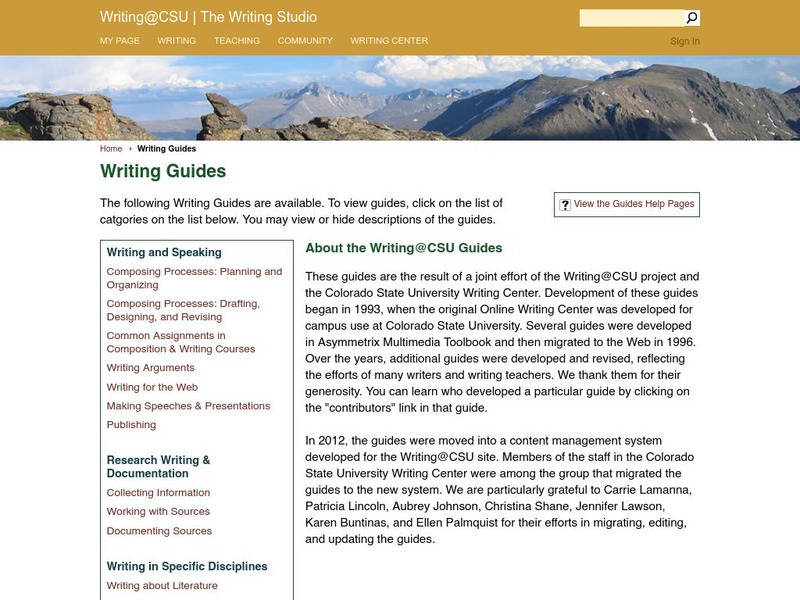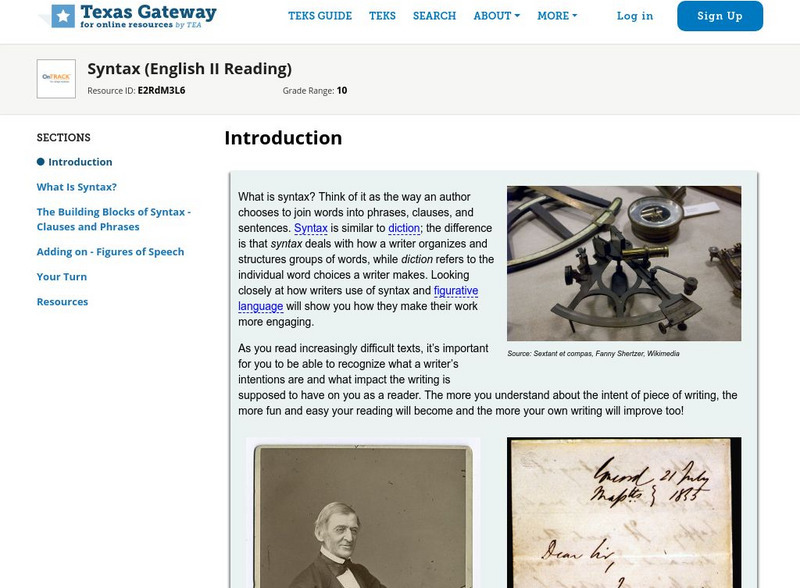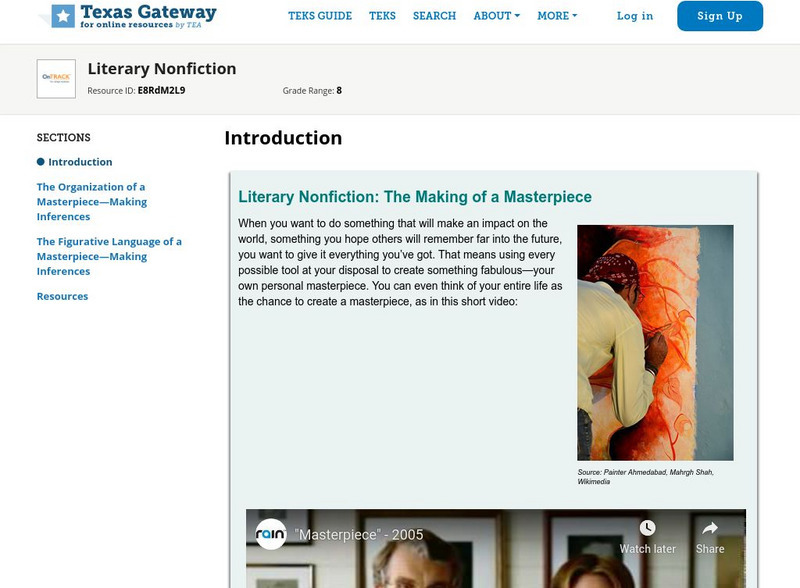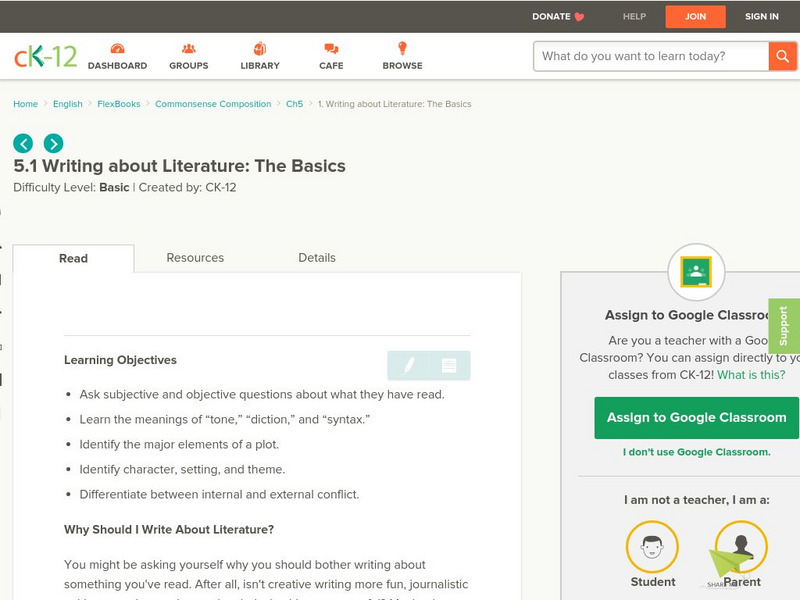Capital Community College Foundation
Guide to Grammar and Writing: Developing a Definition
Not sure what a definition paper is? This is a great site from the Capital Community College to help you with developing a definition. Includes a sample essay and guiding questions.
TES Global
Blendspace: Literary Terms Resources
This Blendspace provides assorted references for literary terms and brief literary terms assessments. This blendspace is designed to support all secondary students, including those who will be taking AP literature courses.
TES Global
Tes: Analyzing & Comparing Non Fiction
[Free Registration/Login Required] Resource notes to aid students as they analyze different types of nonfiction. The GAP (genre, audience, and purpose) acronym is provided to use when comparing nonfiction texts.
Colorado State University
Colorado State University: Writing @ Csu Writing Guides
This is a fairly sophisticated series of writing guides. It assumes that users already have a solid grasp of spelling, grammar and mechanics, so it focuses more on organization and types of presentation than on more basic skills....
Colorado State University
Colorado State Writing Center: Critical Reading
In-depth instructions on critical reading with lots of links to more reading guides and activities. A good site to help improve reading skills to become a better writer.
Other
Biographical Dictionary
Students are able to connect to a search engine containing a dictionary that "covers more than 28,000 notable men and women who have shaped our world from ancient times to present day."
AdLit
Ad lit.org: What's the Big Idea? Integrating Young Adult Literature
Drawing on New York City teachers' experiences, this article examines three ways to effectively integrate young adult literature into the curriculum: use core texts (usually novels, but also other genres as well) that the entire class...
Annenberg Foundation
Annenberg Learner: Literary Visions
A series of 24 instructional videos, each about 30 minutes in length, designed to teach literary analysis. Topics include Responding to Literature, The Elements of Short Fiction, Tone and Style in Short fiction, The Elements of Poetry,...
E Reading Worksheets
E Reading Worksheets: Nonfiction Passages and Functional Texts Worksheets
In this learning module, students will practice reading nonfiction passages. Students will also have the opportunity to answer multiple choice comprehension questions, answer short and extended response questions, and take a test. This...
Texas Education Agency
Texas Gateway: Literary Nonfiction
Analyze literary nonfiction, particularly speeches, by making inferences and drawing conclusions based on evidence in the text.
Texas Education Agency
Texas Gateway: Analyze Point of View in Literary Texts/fiction
Identify and understand an author's choice of point of view, including limited versus omniscient and subjective versus objective.
Texas Education Agency
Texas Gateway: Compare/contrast Themes and Genres in Literary Texts
You will learn how to analyze, make inferences, and draw conclusions about theme and genre in different cultural, historical, and contemporary contexts and provide evidence from the text to support your understanding.
Texas Education Agency
Texas Gateway: Literary Terminology: Practice 5 (English I Reading)
[Accessible by TX Educators. Free Registration/Login Required] You will practice using terminology critical for comprehension, interpretation, and analysis of poetry, drama, and fiction.
Texas Education Agency
Texas Gateway: Development of Characters Through Literary Devices
Rcognize how literary devices such as character foils can create complex characters in a short story.
Texas Education Agency
Texas Gateway: Diction and Tone (English Ii Reading)
Evaluate the role of diction and tone in literary nonfiction such as speeches, essays, and other forms.
Texas Education Agency
Texas Gateway: Close Reading of Prose: Practice 2 (English Ii Reading)
Read carefully in order to identify diction, tone, and irony, and evaluate their impact on the meaning of a text.
Texas Education Agency
Texas Gateway: Syntax (English Ii Reading)
Evaluate the role of syntax in literary non-fiction such as speeches, essays, and other forms.
Texas Education Agency
Texas Gateway: Literary Nonfiction
Learn how to analyze literary nonfiction, particularly speeches, by making inferences and drawing conclusions based on evidence in the text.
Other
The Wondering Minstrels
The Wondering Minstrels website provides a poem a day, complete with analysis, criticism, biographical information, literary anecdotes, trivia, and our own skewed sense of humor. RL.9-10.10a&b text complexity, RL.11-12.10a/b Text...
CommonLit
Common Lit: The Storyteller
A learning module that begins with "The Storyteller" by Saki, accompanied by guided reading questions, assessment questions, and discussion questions. The text can be printed as a PDF or assigned online through free teacher and student...
Quizlet
Quizlet: Literary Elements Definitions
Learn about 32 different literary elements with flashcards, quizzes, and interactive games.
Other
Ncrel: Reading Strategies: Before, During, and After [Pdf]
This page provides a detailed chart to aid students' understanding of texts. It goes through the steps of pre-reading, during reading, and after reading, outlining what students should be thinking about as they interact with a text. This...
CK-12 Foundation
Ck 12: 6.1 Writing About Literature: Analyzing Prose
[Free Registration/Login may be required to access all resource tools.] Learn to analyze prose by understanding connotation and denotation, identifying metaphors and similes, looking for repetition, and finding imagery in a text.
CK-12 Foundation
Ck 12: 5.1 Writing About Literature: The Basics
[Free Registration/Login may be required to access all resource tools.] Learn the basics of how to write about literature by asking subjective and objective questions; use tone, diction, and syntax; identify plot elements, and...






















